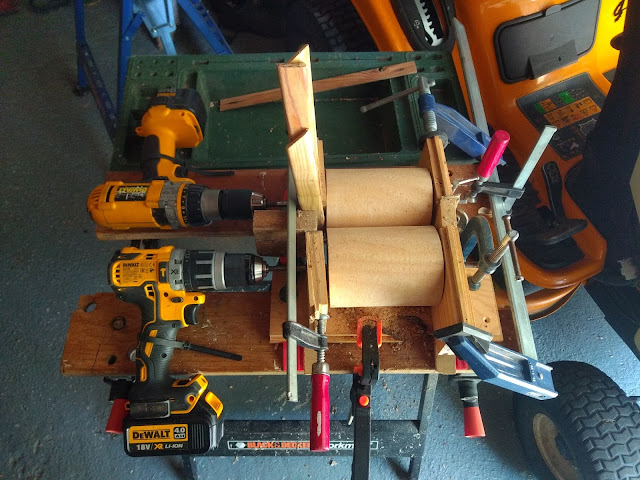Commercial crushers are around £150, being knurled steel rollers in a frame.
Having had a go at a crusher using a 13mm roughed up rod and a fixed plate (ok, but very very slow ~2kg/hour) I got a quote for some turned steel 40mm diameter, 200mm long, knurled. That worked out at around £50 + delivery.
You can use a corona style flour mill, but this is generally reckoned to be no good longer term, as the bits wear out, the genuine ones are expensive, and the copy ones are junk.
A google revealed that people had make wooden mills.
The hard bit is making round wood. Anything bought, like a rolling pin, cannot be post-drilled perfectly in the centre. As I have a few tonnne of beech and oak, it seemed a good idea to make some round stock.

 Starting with a log that I cut for firewood this year. About 3 years old.
Starting with a log that I cut for firewood this year. About 3 years old.marking out the round - about 50mm. Hack it to rough size with an axe. Square cut one end. Mark centre on other end. Drill the hole on a pillar drill to suit a threaded bar. I used 8mm. Length was dictated by the longest drill bit.
Secure wood onto bar with 4 nuts and a few washers.
The 'lathe' 2 brackets to hold the blank at the ends. The uprights will support the router. All this lot is clamped to a work bench.


Mount the blanks and stick a very low rev motor on the shaft

Add a router. Start the rotation, ACW in my case.

 Take small slices in many passes and create the stock.
Take small slices in many passes and create the stock.If one end is a larger diameter than the other, pack the larger diameter end with half the diameter difference.
Voila. A run out of pretty much 0. A taper of around 0.3mm.
Next make a box and mount the rollers. One is 42mm, other 50mm. These were the biggest bits in the store. I added some horizontal slots to one roller for grip, but as both rollers must rotate, it doesnt really matter. It is reckoned that about 100mm, you don't need grip or drive both rollers (1 youtube video shows a metal version make out of 4" steel tube with just the odd groove) The 8mm shaft is rolled steel I had lying around. I drilled a 2mm hole in the shaft, fitted a pin and made a corresponding slot in the wood to get drive.
This moves about 0.5kg/minute, but does need two drills at say 200rpm. I'll need to make some cogs, and more importantly add some bearings. The box above just used a dab of grease and the gap adjustment to 1mm was done with some drilled plate screwed over over-size holes in the frame.
The rollers have a bit of denting, but are hardly marked. I'll try flaming the wood, which is apparently done on baseball bats. And make some bigger rollers. More importantly, mount the box over a barrel somehow, as it fills after about 700g of grain has passed through.
Bearings on order. 8mm shafts are used on skateboards, so bearings are readily available in 4 packs for a few £.
I have a motor and gearbox from an old can opener somewhere which should work well..
A few extra pictures from a later turning. I took ~200mm slices of beech, put a rod down the middle and reduced them to 100mm. The rig grew a little, but the same principal. And some skateboard bearings. Run out & taper around 0.1mm
Currently waiting to see if the 3 I cut will split before assembling a crusher.
Update 2/8/20. 5 years on, the rollers have not split. Did a quick test to check they work well enough to justify a full rig. Had to run both rollers, but only very slowly. Gap varied a lot, but statically about 0.5 - 1mm. Ran the grain through a second time, but it didnt change it very much. Rollers have a patina, but no great dents.










No comments:
Post a Comment